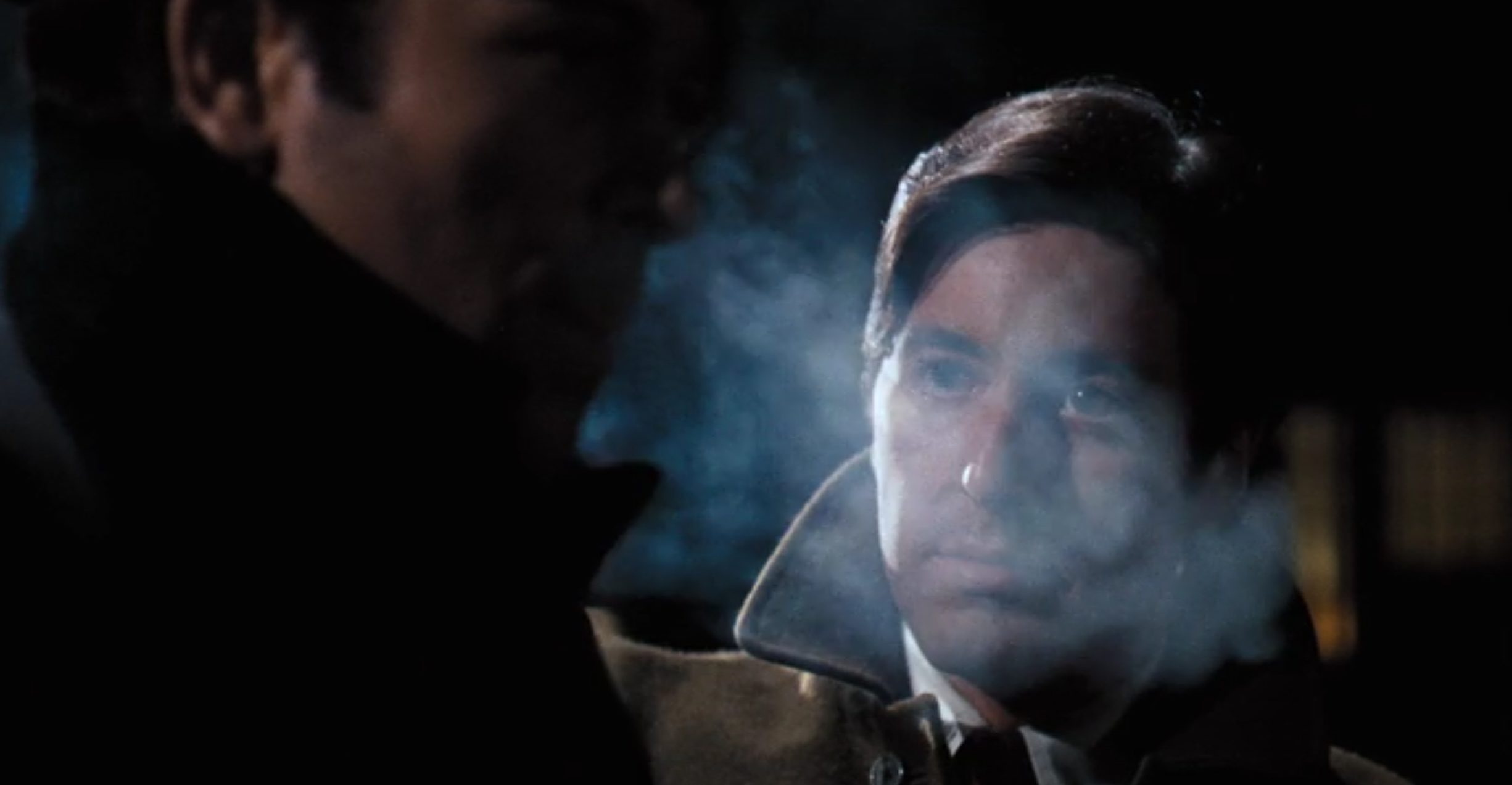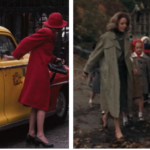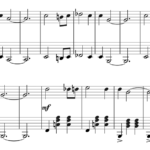Inhale, Exhale: Cigarettes and the Power of Michael Corleone
By Meaghan Allen
Few people smoke in Coppola’s The Godfather, and for many of those who do, the cigarette functions more as a prop than as an expression of an idea about their character. However, the moments that Michael Corleone, played by Al Pacino, chooses to smoke are exceptional, deliberate moments: the action is in fact an action and not something done absent-mindedly. Michael smokes his cigarettes with purpose, as an image of his authority—of his emotional and mental strength as Godfather-in-the-making.
The choice of a cigarette to represent Michael’s symbolic power is significant because a cigarette is not a latent, or concealed, object: it consumes; it burns; it has the potential to kill and destroy. It is a piece of death that fits between the fingers and is kissed as the smoker inhales its substance, filling the body with fire. A cigarette demands a certain sense of control and presence, and—when used consciously—can be evocative of raw force.
The subtle symbolism of cigarettes is developed especially across three scenes in The Godfather: the scene where Michael comes home after Vito has been shot; the scene where Michael stands guard for his father outside the hospital; and the scene in which Michael is officially named Don. Whether through Michael’s physical movements (in particular his handling of cigarettes and lighters) or through the visual composition of the scene’s frame, Coppola underscores that, for Michael, the cigarette serves as a totem of dominance, control, and cool authority.
***
In the scene where the Family deliberates after the shooting of Vito, we see five men sitting in the dark office of the Corleone home. The shot is a medium ensemble shot of Michael (his back to the camera), Tom Hagen (profile), Sonny (almost direct center), Clemenza (3/4 face viewable), and Tessio (most of his face obscured, so we see mainly the back of his head). The camera is located behind the Don’s table, in line with the perspective of someone sitting in the leather chair, an evocation of Vito’s presence despite his being in the hospital. Out of focus in the foreground are a few objects sitting on the table, elements of the mise-en-scene: a cup, a small business ledger, some unidentifiable (due to the shadows) desk trinkets, and a pack of cigarettes.
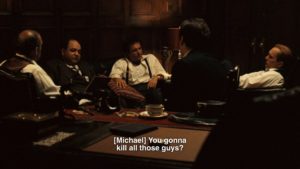
The men are all talking, discussing how to proceed given the news that Sollozzo has nearly succeeded in murdering Vito. In the whirling current of the conversation, Michael—who has been silent—comments, “You gonna kill all those guys” (referring to Sollozzo, Barzini, Tattaglia), and Sonny barks back, “Hey Mikey stay out of it!” This abrupt response silences Michael, and his lack of voice is tangible, a void in the overlapping whir of conversation. A beat later, though, he turns his head, and his face is now in profile. He turns his head further, giving the camera a full view of his face, and looks on the desk, possibly for some hint of encouragement from his missing father, to find his voice: he sees the pack of cigarettes. Michael gets out of his chair, walks very briefly out of the frame, and then re-enters in the foreground to grab a cigarette from the pack, which he tosses haphazardly back onto the table. He is now located in the dark shadows at the edge of the frame, his body a shapeless mass that morphs into the limits of the shot, becoming one with the shadows, not only of the scene but of the shadowy criminal underworld.
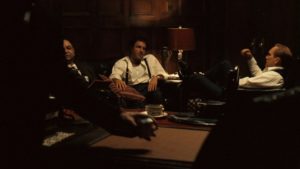
He is standing, meaning that the others must look up at him when they speak. Sonny points to Michael, says something incomprehensible regarding “Do me a favor” (which loosely recalls the opening scene between Vito [Michael] and Bonasera [Sonny] who comes to the Godfather for a ‘favor’)—a comment to which Michael does not respond verbally. Instead he moves back to his chair and sits, the cigarette firmly between his lips. In a few calculated movements Michael has not only foreshadowed his readiness to enter the family business by becoming one with the shadows of the frame and room, but he has also taken charge of the shot by seeking his emblematic cigarette.
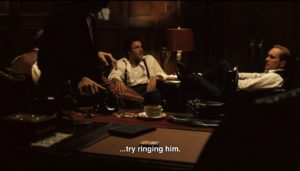
In the composition of the medium ensemble shot, Sonny appears to be the focus, as the man in power, and Michael is presented as occupying a subordinate position, with his back to the camera. But by moving in the frame, coming closer to the camera, and therefore becoming a larger, more dominant presence, Michael has become the center of attention. He is now the man in power. Sonny may still be handling the logistics of business as the perceived head of the family, but Michael is the interesting, active presence. He captures the camera’s gaze, and he does so to light a cigarette.
This cigarette is not any mere cigarette: it is Michael’s first cigarette in the film, and it was presumably Vito’s as it was on his desk. This cigarette, this token of strength and leadership, comes from the reigning head of the family. Even if the cigarette was not originally Vito’s, it is coming from a place of power by being in the office, on the Don’s desk. When it enters Michael’s mouth and he inhales the essence of the cigarette and has it fill his body, it endows him with metaphorical authority.
***
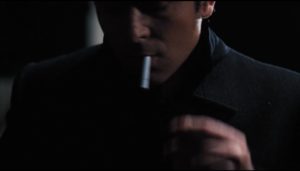
The symbolic power of this cigarette carries over and is heightened in the next significant cigarette scene, which occurs between Enzo, the baker, and Michael outside the hospital later that night. Enzo’s hands are shaking uncontrollably as he reaches into his coat pocket for his pack of smokes. He and Michael have just successfully deferred an attack on Don Corleone, who has been shot and is recovering in the hospital, by standing out by the front gate of the hospital posing as armed body guards. The close-up shot pans from Enzo’s hands retrieving a cigarette up towards his face, the camera gracefully following the movement of his hands. The further towards his mouth his hand moves, the more violently he begins to shake in intense spasms. He turns his face away to scan his surroundings in an attempt to collect his bearings; the clicking of the lighter as he struggles to strike it can be heard.
We cut to a close-up of Enzo’s hand unsuccessfully igniting the lighter; he fumbles repeatedly, unable to control his hand muscles enough to turn the flint wheel and strike the flame. Michael’s hands then reach into the frame. The camera subtly follows Michael’s hands as they successfully turn the flint wheel on the first attempt and a strong flame flares. The frame holds, and Enzo leans down into Michael’s hands to light his cigarette. As Enzo pulls out of the frame, the camera angle cuts towards a medium close-up of Enzo and Michael, the focus of the shot now on Michael: he is looking down at his hands with intense concentration, his face enveloped in the smoke exhaled by Enzo’s cigarette. We then cut to a close up of Michael’s hands still holding the lighter, the lid still up; he pauses, briefly, before snapping the lid shut as police sirens enter the soundscape.
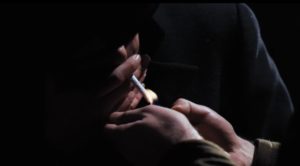
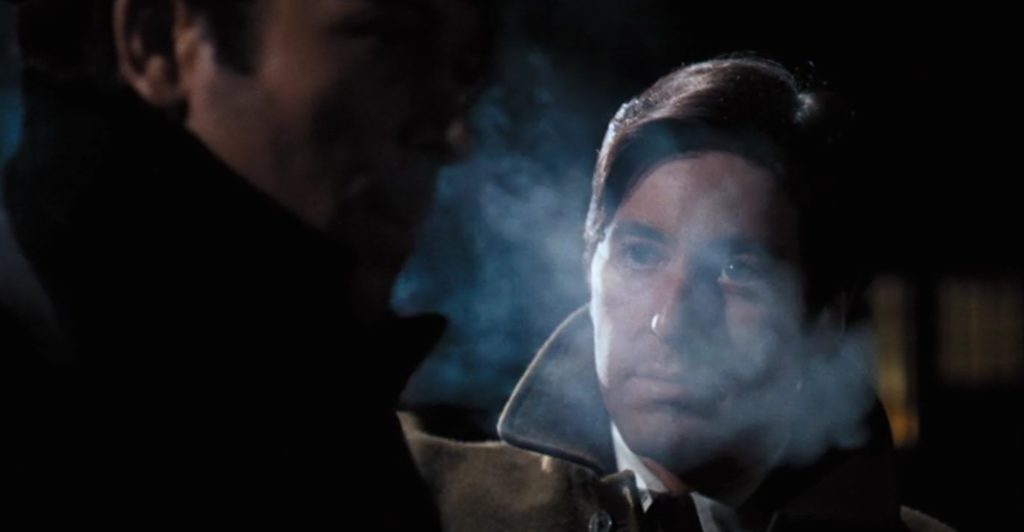
There is a lot going on in this particular encounter, one that lasts only twenty seconds of an almost three-hour film. What is revealed about Michael’s character is crucial. This scene outside the hospital occurs immediately after Michael pledges his allegiance to his father and by implication the family, declaring at Vito’s bedside that he is finally ‘with’ them. Michael has now officially entered the criminal underworld, posing as an armed mafioso, and he has done so with grace and courage. Despite the high risk and tension of a difficult situation he maintains his composure.
The juxtaposition of Enzo’s shaking hands with Michael’s steady hands underlines that Michael is capable of staying rational, calm, collected, and cool in this monstrous syndicate. He is in full control of his emotions, thoughts, and actions—embodying a composure that is absolutely necessary if he wishes to follow in his father’s footsteps and become Don. Also noteworthy is the choreography of power expressed by the gestures: Enzo bends down to light his cigarette, but Michael does not move his hands towards Enzo’s face. Michael is the provider of light, sustenance, and protection; Enzo merely receives these gifts.
The source of these gifts, a lighter, also carries a great deal of symbolic resonance. A lighter is an object capable of complete destruction: it has the capacity to burn all obstacles that stand in the way, and it furnishes fuel for the totemic cigarettes that Michael smokes. This small, sleek item, unassuming in its power, might be said to find a parallel in the character of Michael—the decorated war veteran, the ‘good kid’ who becomes the meticulous, cold-blooded, murderous Godfather by the end of the film. The lighter and its essential companion the cigarette have begun to function, then, as a cinematic trope expressing Michael’s control as Don, his observant nature, and his ability to destroy and be the hand of death. In short, they suggest his complete patriarchal (possibly phallic) power as Godfather.
***
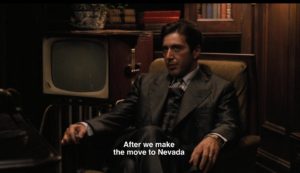
The final compelling scene of Michael’s smoking occurs at a transitional moment in his rise as Godfather, when Vito first places Michael in charge. In this scene, which again occurs in the family office, the shot switches from a brief ensemble shot of Michael sitting beneath the lamp, the only source of light in the shuttered room, to a medium shot of Michael in his chair. His legs are crossed and he is twirling his lighter in his hand as he talks of moving the family’s business to Nevada. He is in a suit (wearing the same tie he does at the baptism), and his body is active, his fingers lightly tapping the lighter and his crossed leg restlessly bouncing. His authority as Don is not being taken seriously – Clemenza and Tessio keep turning to Vito, not Michael, for instruction. It is not until after the brief dialogue between Vito, Clemenza, and Tessio, where Vito declares “Be a friend to Michael,” that Michael’s dominion as Don takes hold.
This absolute reign begins when the shot again becomes a medium ensemble and Michael ascends from his chair beneath the light to stand assertively behind the Don’s desk. As he takes his place, it is clear that he now has a lit cigarette in his hand. His voice is more confident and demanding, and he not only has physical power over Clemenza and Tessio (who are now sitting below him), but he also has his token of authority securely between his two fingers. Michael begins to hand down a series of authoritative decisions.
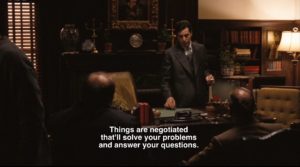
The film cuts to a middle shot of Carlo as it is revealed he will be in charge in Nevada; it cuts to a middle shot of Tom, who will no longer be consigliere but instead the family lawyer in Nevada (the shot lingers to gauge Tom’s reaction); then we cut to a medium close-up shot of Michael, who is still standing. The cigarette has moved out of the frame but the smoke can be seen languidly drifting up—a reminder that it is still there, burning away, mixing in the air that Michael inhales to speak. The smoke mimics Michael’s thoughts and actions, curling and twisting like his soul as he adapts to the complex situations presented throughout the film.
Michael’s hands do not shake as he holds a thread of death in them, the ability to destroy and conquer evoked by a single image: the cigarette. Its source of power, the lighter, a small compact brass box, has the ability to burn and consume everything that gets in its way; it is a portable inferno of judgment—not so far from Michael during the infamous baptism sequence.
***
While these three scenes suggest the arc of Michael’s development via his handling of cigarettes, cigarettes are Michael’s companion and totem in three other scenes too. In the anticipation of ‘the meet’ with Sollozzo, Michael gently places a cigarette between his lips in the family kitchen to keep his calm while Sonny and Tom get anxious; when Mo Green challenges Michael in Las Vegas, Michael lights a cigarette as he prepares to tell Mo how things should be, simultaneously twirling his lighter as he does so (possibly alluding to Mo’s eventual death); and finally, Michael lights two cigarettes in the last scene of the film after Connie accuses him of murdering Carlo and Kay earnestly presses him on whether he had Carlo killed. He lights up, first, when he is giving her his ‘one-time-only’ answer about the true nature of his business; and he lights up again when he is framed by the door as Kay prepares drinks in the foreground and members of the family filter into his office.
For Michael, smoking allows for a form of meditation and deliberation that is also at the heart of his newfound power. Through the methodical rhythm of inhalation and exhalation, he achieves a cool control that becomes the personal signature of his brand of dominance. Held gently but confidently between the two fingers of Michael’s hand, the cigarette claims its place in the hands of the Godfather whose hands do not shake, the man who does not allow the strings of the family business to tangle. Michael is the one who holds the strings taut and with care, all the while enveloped in the drifting smoke of power.

